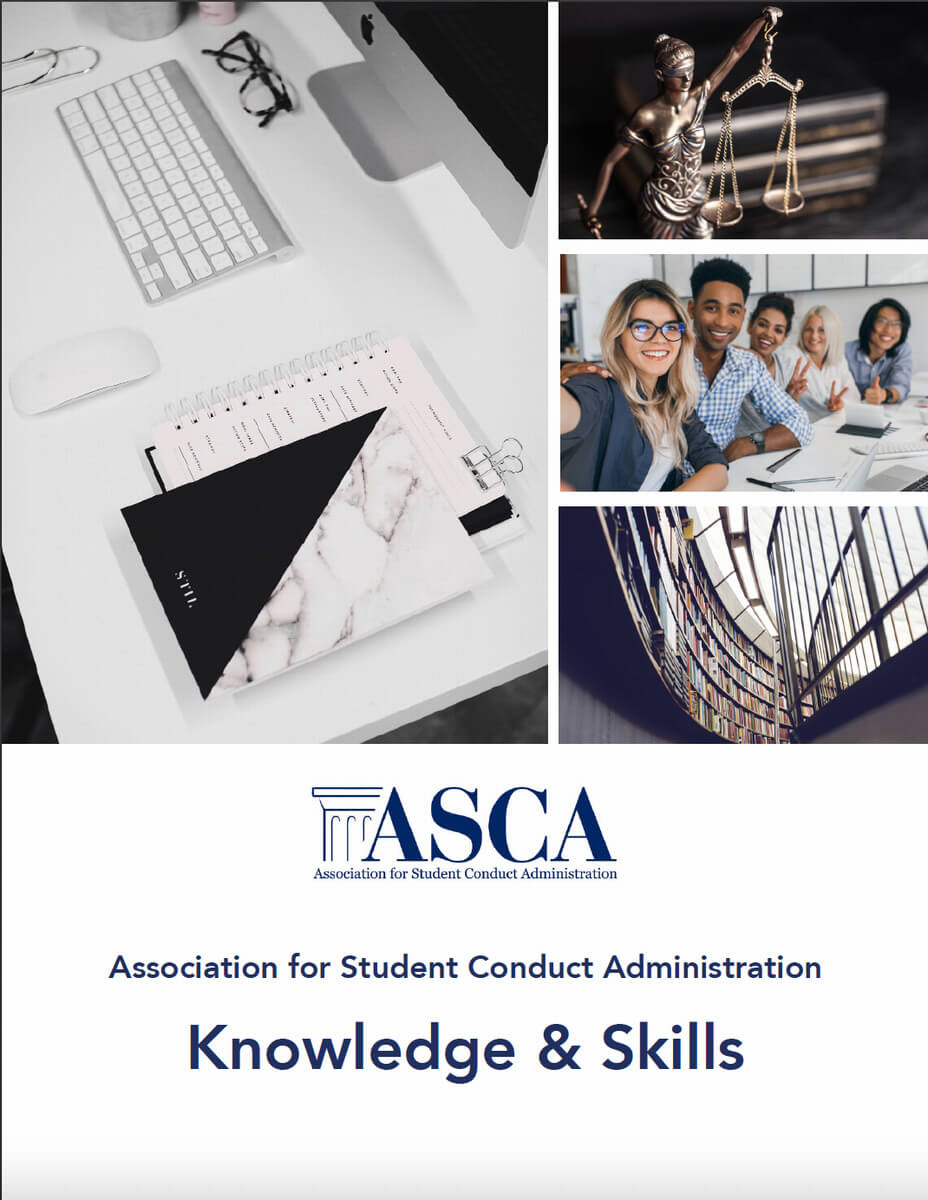From 2019-2021, an ASCA Task Force comprised of Christina Parle, Alan Acosta, Reyna Anaya, Patience Bryant, Kateeka Harris, and Pam Malyk immersed themselves in getting to the core of the Knowledge Areas and Skills present within our profession. The resulting product, the ASCA Knowledge & Skills, is designed to inform the work of student conduct professionals and student conduct organizations specifically and are not intended to replace or supplant any other professional competency list, including, but not limited to, the ACPA/NASPA professional competencies or the Council for the Advancement of Standards in Higher Education.
For this Presidential Task Force, the concept of competencies was intentionally referred to as “Knowledge Areas & Skills” so as not to imply learning in the profession stops. Additionally, the language “functional area” and “organization/organizational” were used intentionally to be inclusive of all professionals and all types of organizational structures in the field of student conduct.
The Task Force wrestled with many questions and considerations in the development of the Knowledge and Skills. First, the Task Force intentionally did not base the Knowledge and Skills on years of experience or job type, because one of the foundational core beliefs of the profession is every individual’s experience and professional journey that brought them to student conduct is unique and not dependent on years in the profession or title. It was also crucial different types of offices were considered, with additional consideration given to offices of one. The Task Force also worked to ensure the Knowledge Areas were inclusive of all institutional types, geographic locations, and Carnegie classifications.
The Task Force developed eight Knowledge Areas:
- Administration
- Assessment
- Education
- Equity and Intentional Inclusion
- Internal and External Partnerships
- Investigation
- Law & Policy
- Resolution Management

The Areas are further outlined in three phases: Foundational, Intermediate, and Advanced. Due to the uniqueness with which student conduct is addressed on respective campuses, these Areas are designed to be transferable regardless of if an individual’s job responsibilities are in student conduct directly, an area closely related, or oversight of the student conduct functional area is one aspect of several within their scope of responsibility. These Areas are situated within the context of the student conduct profession, and each individual constantly working towards equity and inclusion within individual institutional processes, the structures of the higher education profession broadly, and the global society as a whole.
The Areas are not designed to be static or linear. Each person brings their own attitudes and beliefs to the work of student conduct. As such, professionals and their perspectives grow with time and experience, and they will acquire the Knowledge Areas and Skills to move from one phase to another. As people continue on their professional journeys, individuals can simultaneously be at different phases in different Areas, can revisit phases within an Area at any time, or be in multiple phases within a single Area at once. Professionals are encouraged to use these Areas as a guide for their personal development and growth. Additionally, these Areas are intended for many different uses, including, but not limited to:
- creation of educational content
- consideration by hiring managers
- consideration in professional development decisions
- research and scholarship
- consideration in developing collaborative partnerships
- communicating the value of student conduct work.
In addition to the Knowledge Areas specifically, the Task Force also believes the following attributes, behaviors, and characteristics are needed for student conduct professionals: ethical decision making, navigating developmental conversations, managing healthy conflict and confrontation, active listening skills, authenticity, emotional intelligence, time management, flexibility, working collaboratively with others, de-escalation skills, critical thinking, communication, respect for confidentiality, and commitment to life-long learning. With the creation of these Areas, ASCA aims to continue its contribution to the growth of every professional and its work as the leading voice of the student conduct profession in higher education.
